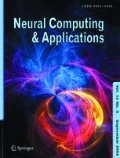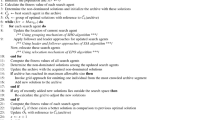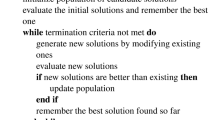Abstract
One heuristic evolutionary algorithm recently proposed is the gravitational search algorithm (GSA), inspired by the gravitational forces between masses in nature. This algorithm has demonstrated superior performance among other well-known heuristic algorithms such as particle swarm optimisation and genetic algorithm. However, slow exploitation is a major weakness that might result in degraded performance when dealing with real engineering problems. Due to the cumulative effect of the fitness function on mass in GSA, masses get heavier and heavier over the course of iteration. This causes masses to remain in close proximity and neutralise the gravitational forces of each other in later iterations, preventing them from rapidly exploiting the optimum. In this study, the best mass is archived and utilised to accelerate the exploitation phase, ameliorating this weakness. The proposed method is tested on 25 unconstrained benchmark functions with six different scales provided by CEC 2005. In addition, two classical, constrained, engineering design problems, namely welded beam and tension spring, are also employed to investigate the efficiency of the proposed method in real constrained problems. The results of benchmark and classical engineering problems demonstrate the performance of the proposed method.











Similar content being viewed by others
References
Kennedy J, Eberhart R (1995) Particle swarm optimization. In: Proceedings of IEEE international conference on neural networks, vol 4, pp 1942–1948
Shi Y, Eberhart R (1998) A modified particle swarm optimizer. In: IEEE international conference on evolutionary computation. Anchorage, Alaska, pp 69–73
Holland JH (1992) Genetic algorithms. Scientific Am 267:66–72
Price K, Storn R (1997) Differential evolution. Dr. Dobb’s J 22:18–20
Price KV, Storn RM, Lampinen JA (2005) Differential evolution: a practical approach to global optimization. Springer, New York
Dorigo M, Birattari M, Stutzle T (2006) Ant colony optimization. Comput Intell Mag, IEEE 1(4):28–39. doi:10.1109/MCI.2006.329691
Simon D (2008) Biogeography-based optimization. IEEE Trans Evol Comput 12:702–713
Mirjalili S, Mirjalili SM, Lewis A (2014) Let a biogeography-based optimizer train your multi-layer perceptron. Inf Sci 269:188–209. doi:10.1016/j.ins.2014.01.038
Mirjalili S, Mirjalili SM, Lewis A (2014) Grey wolf optimizer. Adv Eng Softw 69:46–61
Gandomi AH, Alavi AH (2012) Krill Herd: a new bio-inspired optimization algorithm. Commun Nonlinear Sci Num Simul 17:4831–4845
Guo L, Wang G-G, Gandomi AH, Alavi AH, Duan H (2014) A new improved krill herd algorithm for global numerical optimization. Neurocomputing. doi:10.1016/j.neucom.2014.01.023
Rashedi E, Nezamabadi-Pour H, Saryazdi S (2009) GSA: a gravitational search algorithm. Inf Sci 179:2232–2248
Mirjalili S, Mirjalili SM, Yang X-S (2013) Binary bat algorithm. Neural Comput Appl 1–19. doi:10.1007/s00521-013-1525-5
Mirjalili S, Lewis A (2013) S-shaped versus V-shaped transfer functions for binary particle swarm optimization. Swarm Evol Comput 9:1–14
Lai X, Zhang M (2009) An efficient ensemble of GA and PSO for real function optimization. In: 2nd IEEE International conference on computer science and information technology, 2009. ICCSIT 2009. pp 651–655
Esmin AAA, Lambert-Torres G, Alvarenga GB (2006) Hybrid evolutionary algorithm based on PSO and GA mutation. In: International conference on hybrid intelligent systems. IEEE Computer Society, Los Alamitos, CA, USA, p 57. http://doi.ieeecomputersociety.org/10.1109/HIS.2006.33
Zhang WJ, Xie XF (2003) DEPSO: hybrid particle swarm with differential evolution operator, vol. 4, pp. 3816–3821
Niu B, Li L (2008) A novel PSO-DE-based hybrid algorithm for global optimization. In: advanced intelligent computing theories and applications. With aspects of artificial intelligence, pp 156–163
Holden NP, Freitas AA (2007) A hybrid PSO/ACO algorithm for classification, pp 2745–2750
Holden N, Freitas AA (2008) A hybrid PSO/ACO algorithm for discovering classification rules in data mining. J Artif Evol Appl 2008:2
Wang G-G, Gandomi AH, Alavi AH, Hao G-S (2013) Hybrid krill herd algorithm with differential evolution for global numerical optimization. Neural Comput Appl 1–12. doi:10.1007/s00521-013-1485-9
Wang G-G, Gandomi AH, Alavi AH (2013) An effective krill herd algorithm with migration operator in biogeography-based optimization. Appl Math Model. doi:10.1016/j.apm.2013.10.052
Noman N, Iba H (2008) Accelerating differential evolution using an adaptive local search. IEEE Trans Evol Comput 12:107–125
Chen J, Qin Z, Liu Y, Lu J (2005) Particle swarm optimization with local search, pp 481–484
Chen S, Mei T, Luo M, Yang X (2007) Identification of nonlinear system based on a new hybrid gradient-based PSO algorithm, pp 265–268
Meuleau N, Dorigo M (2002) Ant colony optimization and stochastic gradient descent. Artif Life 8:103–121
Wang G–G, Gandomi AH, Alavi AH (2013) A chaotic particle-swarm krill herd algorithm for global numerical optimization. Kybernetes 42:9
Wang G-G, Guo L, Gandomi AH, Hao G-S, Wang H (2014) Chaotic Krill Herd algorithm. Inf Sci. doi:10.1016/j.ins.2014.02.123
Saremi S, Mirjalili SM, Mirjalili S (2014) Chaotic Krill Herd optimization algorithm. Procedia Technol 12:180–185
Wang G-G, Gandomi AH, Alavi AH (2014) Stud Krill Herd algorithm. Neurocomputing 128:363–370
Wang G, Guo L, Wang H, Duan H, Liu L, Li J (2014) Incorporating mutation scheme into krill herd algorithm for global numerical optimization. Neural Comput Appl 24(3–4):853–871. doi:10.1007/s00521-012-1304-8
Zhang Y, Wu L, Zhang Y, Wang J (2012) Immune gravitation inspired optimization algorithm advanced intelligent computing, vol 6838. In: Huang D-S, Gan Y, Bevilacqua V, Figueroa J (eds). Springer, Berlin/Heidelberg, pp. 178–185
Sinaie S (2010) Solving shortest path problem using gravitational search algorithm and neural networks. Master, Faculty of Computer Science and Information Systems, Universiti Teknologi Malaysia (UTM), Johor Bahru, Malaysia
Shaw B, Mukherjee V, Ghoshal SP (2012) A novel opposition-based gravitational search algorithm for combined economic and emission dispatch problems of power systems. Int J Electric Power Energy Syst 35:21–33
Chen H, Li S, Tang Z (2011) Hybrid gravitational search algorithm with random-key encoding scheme combined with simulated annealing. IJCSNS 11:208
Hatamlou A, Abdullah S, Othman Z (2011) Gravitational search algorithm with heuristic search for clustering problems. In: Data mining and optimization (DMO), 2011 3rd conference on 2011, pp 190–193
Li C, Zhou J (2011) Parameters identification of hydraulic turbine governing system using improved gravitational search algorithm. Energy Convers Manag 52:374–381
Mirjalili S, Mohd Hashim SZ, Moradian Sardroudi H (2012) Training feed forward neural networks using hybrid particle swarm optimization and gravitational search algorithm. Appl Math Comput 218:11125–11137
Mirjalili S, Hashim SZM (2010) A new hybrid PSOGSA algorithm for function optimization. In: Computer and information application (ICCIA), 2010 international conference on, 2010, pp 374–377
Gauci M, Dodd TJ, Groß R (2012) Why ‘GSA: a gravitational search algorithm’ is not genuinely based on the law of gravity. Nat Comput 11(4):719–720. doi:10.1007/s11047-012-9322-0
Rashedi E, Nezamabadi-Pour H, Saryazdi S (2010) BGSA: binary gravitational search algorithm. Nat Comput 9:727–745
Suganthan PN, Hansen N, Liang JJ, Deb K, Chen Y, Auger A, Tiwari S (2005) Problem definitions and evaluation criteria for the CEC 2005 special session on real-parameter optimization. Nanyang Technological University, Singapore, Tech. Rep, vol 2005005
Derrac J, García S, Molina D, Herrera F (2011) A practical tutorial on the use of nonparametric statistical tests as a methodology for comparing evolutionary and swarm intelligence algorithms. Swarm Evol Comput 1(1):3–18. doi:10.1016/j.swevo.2011.02.002
Wilcoxon F (1945) Individual comparisons by ranking methods. Biometrics Bull 1:80–83
Arora JS (2004) Introduction to optimum design. Academic Press, London
Belegundu AD (1983) Study of mathematical programming methods for structural optimization. Dissertation abstracts international part B: science and engineering [DISS. ABST. INT. PT. B- SCI. & ENG.], vol 43, p 1983
Coello Coello CA, Mezura Montes E (2002) Constraint-handling in genetic algorithms through the use of dominance-based tournament selection. Adv Eng Inf 16:193–203
He Q, Wang L (2007) An effective co-evolutionary particle swarm optimization for constrained engineering design problems. Eng Appl Artif Intell 20:89–99
Mezura-Montes E, Coello CAC (2008) An empirical study about the usefulness of evolution strategies to solve constrained optimization problems. Int J General Syst 37:443–473
Coello Coello CA (2000) Use of a self-adaptive penalty approach for engineering optimization problems. Comput Ind 41:113–127
Mahdavi M, Fesanghary M, Damangir E (2007) An improved harmony search algorithm for solving optimization problems. Appl Math Comput 188:1567–1579
Huang F, Wang L, He Q (2007) An effective co-evolutionary differential evolution for constrained optimization. Appl Math Comput 186:340–356
Yang XS (2011) Nature-inspired metaheuristic algorithms. Luniver Press, UK
Carlos A, Coello C (2000) Constraint-handling using an evolutionary multiobjective optimization technique. Civil Eng Syst 17:319–346
Deb K (1991) Optimal design of a welded beam via genetic algorithms. AIAA J 29:2013–2015
Deb K (2000) An efficient constraint handling method for genetic algorithms. Comput Methods Appl Mech Eng 186:311–338
Lee KS, Geem ZW (2005) A new meta-heuristic algorithm for continuous engineering optimization: harmony search theory and practice. Comput Methods Appl Mech Eng 194:3902–3933
Ragsdell K, Phillips D (1976) Optimal design of a class of welded structures using geometric programming. ASME J Eng Ind 98:1021–1025
Author information
Authors and Affiliations
Corresponding author
Appendix
Appendix
See Fig. 11.
Rights and permissions
About this article
Cite this article
Mirjalili, S., Lewis, A. Adaptive gbest-guided gravitational search algorithm. Neural Comput & Applic 25, 1569–1584 (2014). https://doi.org/10.1007/s00521-014-1640-y
Received:
Accepted:
Published:
Issue Date:
DOI: https://doi.org/10.1007/s00521-014-1640-y




